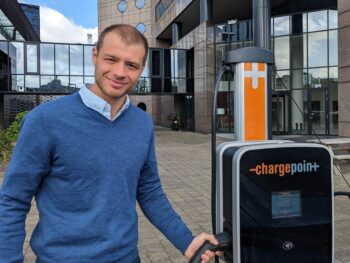King’s Speech 2024: Labour’s plans for transport reform and the industry reaction
Labour has revealed some of its plans for transport reform at this morning’s King’s Speech.

The speech focused on the principles of security, fairness and opportunity for all, and the draft laws will support delivery of the Government’s first steps in its mission to “rebuild Britain”.
During the Speech, the King said, “securing economic growth will be a fundamental mission” but stressed “stability will be the cornerstone of my Government’s economic policy”.
Highways and transport-related legislation included:
- Planning and Infrastructure Bill
- English Devolution Bill
- Passenger Railway Services (Public Ownership) Bill
- Better Buses Bill
- Rail Reform Bill
- High Speed Rail (Crewe to Manchester) Bill
- Skills England Bill
- Great British Energy Bill
However, plans for the 2030 ICE ban were missing, along with wider plans for electric vehicles and the hoped-for Clean Air Bill.
Industry reaction
James Court, chief executive of EVA England
“Today’s extensive announcements on planning reform are encouraging in recognising the need for a wholesale rethink of how our critical national infrastructure can be installed quickly, reliably and consistently. This is all the more essential for electric vehicles and our urgent priority to make sure the national charging infrastructure suitably meets a growing demand, and that we hit our net zero targets.”
Matt Finch, UK policy manager at Transport & Environment (T&E)
“The King’s Speech proves Labour is serious about making our public transport systems fit for the 21st century. This is absolutely needed, as is a renewed focus on how to decarbonise planes, trucks and ships. The new government was elected on a promise to tackle climate change from all sources, including transport, and it mustn’t waste any time on doing so.”
Oliver Lord, UK head of Clean Cities Campaign
“The decision to omit a Clean Air Bill from the King’s Speech is disappointing and a missed opportunity to end toxic air pollution, which is the UK’s biggest environmental health risk and a major cause of health inequities. The Government’s pledges to fix the NHS cannot ignore the fact that air pollution will cost our health and social care system billions every year unless modern day legislation is in place.
“In the absence of the Clean Air Bill, proposals set to be laid before Parliament on buses, rail and devolution provide a clear opportunity to create infrastructure and localised policy that ensures our cities can effectively and rapidly transition to cleaner forms of transport, business and governance that nurture investment and protect our health.”
Edmund King, AA president

Edmund King, AA president
“We welcome the ‘Better Buses Bill’ as this could help ease congestion on roads across the country. We believe the bill could improve connectivity in urban areas, especially if successful Park & Ride schemes, such as those in Oxford and Cambridge, can be used as a blueprint of best practice.
“With the motor industry evolving at a rapid rate with the rise of electric vehicles, connected and autonomous vehicles, it is vital that the future workforce is upskilled. The creation of Skills England can help encourage apprentices to the automotive sector and help unlock their potential.
“We look forward to working with the Government to tackle the priorities of drivers such as fixing potholes, delivering fuel price transparency and improving road safety.”
Greg Ford, head of corporate at RED Training
“The Better Buses Bill and the establishment of Great British Railways promises to ease congestion, but there was little mention of tackling Britain’s crumbling road infrastructure, nor was there any sign of moves to cut road traffic accidents, which remain stubbornly high.”
Paul Hollick, managing director of Lightfoot
“Accelerated investment in a clean energy future through the creation of Great British Energy is welcome, but we need to see more detailed plans and a commitment to decarbonise the UK vehicle fleet in a sustainable way.”
Antoine Picron, senior policy manager for UKI at ChargePoint

Antoine Picron, senior policy manager for UKI at ChargePoint
“We’re pleased to see the new government’s bold vision for the energy industry, aligning with its ambitious target to reduce carbon emissions by 45% by 2030.
“This clean energy commitment represents a coordinated approach, given that it coincides with the 2030 ban on new petrol and diesel vehicle sales stated in the Labour manifesto. As the Government establishes its priorities, it’s crucial that sustainable driving receives equal attention and support.
“As we transition to a more environmentally conscious way of life, the UK has significant potential to accelerate consumer adoption of EVs and address the growing demand for charging infrastructure. We believe transitioning to an EV is one of the single biggest behavioural changes drivers can make to reduce carbon emissions and ensure the UK achieves its net zero ambitions, as well as support the shift to cleaner transportation.”
Sue Robinson, chief executive of the National Franchised Dealers Association (NFDA)
“While The King’s Speech contains positive elements, it is crucial for the Government to address key issues within the automotive retail sector, such as restimulating the private electric vehicle market. Additionally, it is important that NFDA and the broader industry are consulted on any major policy changes related to the ZEV mandate and business rates.”
Kevin Finn, executive chair of the Institute of the Motor Industry (IMI)

Kevin Finn, executive chair of the IMI
“Whilst there were no specific mentions of automotive in the King’s Speech, we are pleased to see the focus on skills with the proposed creation of Skills England, bringing together government, businesses, unions and training providers. With 21,000 vacancies and critical skill gaps in EVs and ADAS, urgent support is needed to maintain road safety and meet government goals.
“The IMI will also represent the views of the automotive workforce and employers as the Apprenticeship Levy is reformed with a Growth and Skills Levy. It is hoped this will give businesses the flexibility they need to spend their levy funds to deliver apprenticeship programmes as well as access modular training to equip existing staff with future-proofed skills. Currently, the automotive training workforce is severely under-resourced, and the pipeline of new talent is not being adequately filled by new apprenticeships.”
Paul Tuohy from transport charity Campaign for Better Transport
“It’s good to see transport back on the agenda with bold plans to grow the network. Both Rail Bills are welcome, as are plans to improve bus services and give more powers to local leaders to deliver local transport systems that work for their communities. We are saddened to see no commitment to reinstating the Northern leg of HS2 however.”
Richard Dilks, chief executive of Collaborative Mobility UK (CoMoUK)

Richard Dilks, chief executive of CoMoUK
“We welcome the Government’s intention to improve services for bus and rail passengers, but there is a clear policy gap when it comes to shared transport, which has the potential to work alongside these other reforms in decarbonising the way we travel.
“Giving e-scooters and other similar vehicles legal status is a common sense move that would bring the UK into line with most other European countries and give people a flexible and green way to get around.
“In the meantime, we would like England’s e-scooter trials to be expanded, with more vehicles covering wider areas in response to local demand. New schemes should also be approved in council areas that could benefit.
“Today’s announcement of plans to give more powers to local councils in England should also include the ability to expand the use of shared transport, whether that is through new bike schemes or on-demand buses following flexible routes.”
Sue Percy, chief executive at the Chartered Institution of Highways and Transportation (CIHT)
“We welcome the announcements as we hope these will begin to provide the certainty and a clarity of vision that will support the highways and transportation sector.
“We are pleased to see that the priorities we identified in our manifesto (including improving and streamlining the planning system, investing in skills, improving bus services and sustainable transport networks) have been included in this legislative agenda.”















